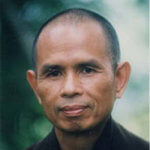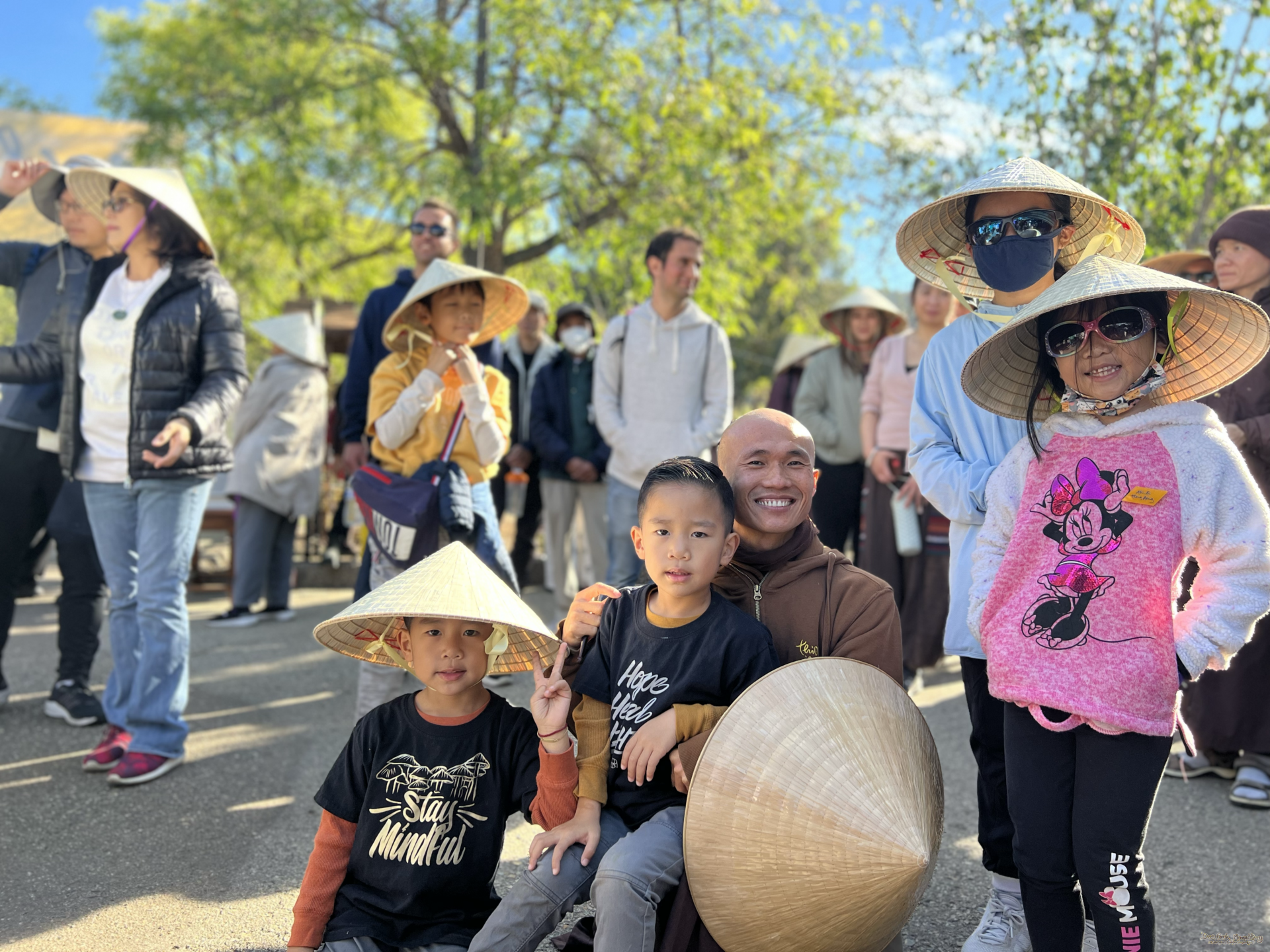Thích Nhất Hạnh teaches us to liberate ourselves from restlessness and find ease, joy, and happiness in the present moment and in Mother Earth.
By Thich Nhat Hanh on
(Part 1 of this Dharma talk can be found here.)
We are the Earth
We know that the Earth is not just the environment. The Earth is ourselves,
Thích Nhất Hạnh teaches us to liberate ourselves from restlessness and find ease, joy, and happiness in the present moment and in Mother Earth.
By Thich Nhat Hanh on
(Part 1 of this Dharma talk can be found here.)
We are the Earth
We know that the Earth is not just the environment. The Earth is ourselves, the Earth is inside us: we are the Earth. Mother Earth has the power to heal and to nourish, but you do not allow Mother Earth to heal you because you are running, looking for something, and you abandon Mother Earth. With mindful breathing and mindful walking, you go back to yourself, back to Mother Earth, and you get the healing you need. Your body and your mind have the power to heal themselves, but society creates a lot of pressure that you don’t know how to resist. You are sucked into it, you are pulled away by it, and you are not yourself. You cannot let Mother Earth heal you or nourish you. So it is very important to stop running, and the practices of mindful breathing and mindful walking are wonderful ways to slow down and to allow nature to heal you. To remember that every breath is healing, every step is healing.
Cultivating peace and ease
There is a good mental formation, called prasábdhi, which means peace, ease, tranquility. There are many ways to translate prasábdhi. You have the capacity to be peaceful, calm, and at ease, but you may not have the chance to cultivate this capacity. Happiness cannot arise without ease, which is one of the seven factors of enlightenment.
If you want enlightenment, you cultivate ease and peace; without these, healing does not take place easily. Cultivating peace is very important and the practices of mindful breathing and mindful walking can help you cultivate more peace.
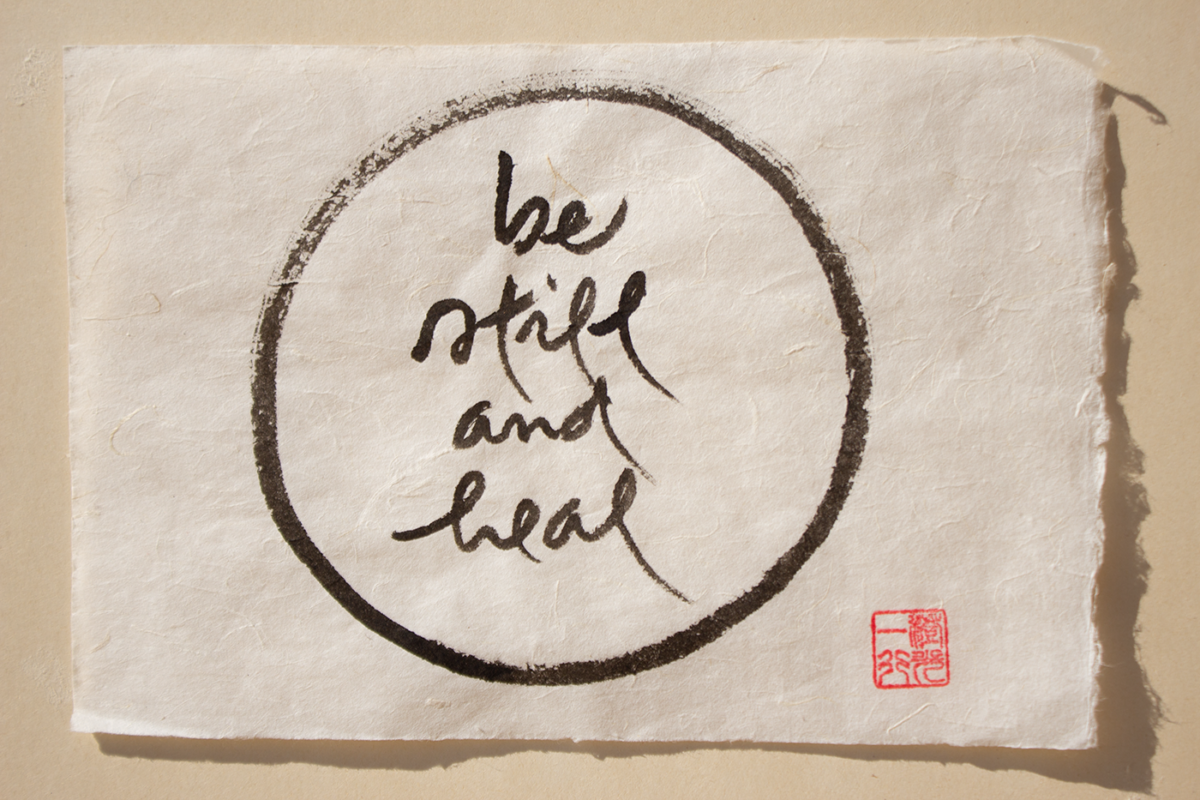
calligraphy by Thích Nhất Hạnh
Liberation from restlessness
There is another mental formation of the opposite nature that you have to deal with, called restlessness, auddhatya, described as winter’s water. When there is a lot of wind, the water is not calm. You can picture a flag waving in the wind; its function is waving and its manifestation is like scattered ashes. It’s like a mind storm, whirling, whirling, whirling. This restlessness prevents our mind from applying ourselves to the good mental formations.
When we are restless there is no chance for good things to happen to us. We feel empty inside and we don’t know how to handle that vacuum, that loneliness. We don’t know what to do with the suffering, the despair inside of us, so we look for something to cover it up. We check our email, we pick up a newspaper, we listen to the news: we look for something to forget the loneliness, the suffering inside.
Our body is restless, our mind also is restless, and we don’t know what to do. We are not mindful, and that is an unwholesome mental formation. There is no peace when we sit. We sit but we feel as if there is a fire, a burning charcoal beneath us. When we walk it feels like we are stepping on fire. There is no peace when we walk, there is no peace when we sit. Even if we try to lie down there is no peace.
We might take refuge in work and become a workaholic. We work not because we like to work, not because we want to have a lot of money. Working helps us take refuge to calm down a little bit. Or we listen to music, or turn on the television, or pick up a newspaper. We do these things to cover up the lack of peace in us. If we learn a language or study Buddhism, we might feel better being busy doing these things. It is comforting that at least this work is not doing harm to anyone. I am studying to forget my lack of peace, my restlessness. In the monastic community there are a few people like that—in America, and even in Plum Village. We believe we are serving the Sangha by working very hard, but it is only not to feel that loneliness, that restlessness in us, that we work. We should not work in that spirit because while it can help us calm down a little, after the work is done the restlessness comes back. Many people are addicted to work. Many children and adults become addicted to electronic games because that serves as a refuge for them to forget their loneliness, their restlessness, for some time. Addiction to the internet has become a kind of disease of our time. We go to the internet because we want to take refuge in something that will let us forget the loneliness, the restlessness in us. We do this to just survive and not to really live. So we have to look deeply to see the real roots of our ill-being. A rabbit can run into a hole for protection, but the rabbit cannot stay there forever. Eventually it has to go out and look for food.
Even in our sitting meditation, we are like rabbits. We use our sitting meditation as a refuge to not suffer from our restlessness and our lack of peace. But then, after sitting meditation we go out and suffer again. That is why practicing breathing and sitting is not the answer if we don’t know how to really breathe and sit. You have to breathe, you have to walk, you have to sit in such a way that you get insight. Without insight you cannot heal yourself.
There are those who have the capacity to enter into dhyana, meditative concentration. They can maintain it for several days, but they only take refuge in the fourth level of meditation, the level of form; that is not the solution because when they get out of the dhyana, they suffer again. That is why we need vipassana and not only shamatha. We need insight to come from our stopping. Vipassana means looking deeply to get insight. Only insight can liberate you from afflictions like restlessness.
Mindfulness must lead to insight
Meditation should not be just a temporary refuge for you to stop suffering for a while. Meditation should have the power to help you to transform the suffering in you. Mindfulness has to lead to concentration and insight.
When we talk about practicing mindfulness to reduce stress, we have to be very careful. Mindfulness cannot reduce stress if it does not provide us with insight—the intention to release tension is not enough. We need to be able to stop running so we can truly release stress; that is why insight is so important.
Our society is caught in the conflict between work and life. When you are so busy, when you work so much, you don’t have time to live. Many people wonder how to establish a balance between work and life because your work can take up all your life. You might be addicted to work, not just because you want to have a lot of money, but because you don’t know how to handle the suffering in you, the loneliness in you, and that is why you turn to work as a refuge. People ask whether technology can help us heal, but first we have to address our addiction to technology.
We have to be mindful when the energy of restlessness manifests. When we have no peace, we have to recognize it and to say hello to that mental formation: “Hello, my restlessness. I know you are there. I will take good care of you.”
Then when you practice mindful breathing, you bring your mind home to your body. When mind and body are together, you are established in the here, in the now. You can get in touch with all the wonders of life. You realize that spending all your time working will not allow you to get in touch with the wonders of life for your healing and nourishment. That is your insight. Only with that insight can you stop trying to take refuge in work to forget your suffering.
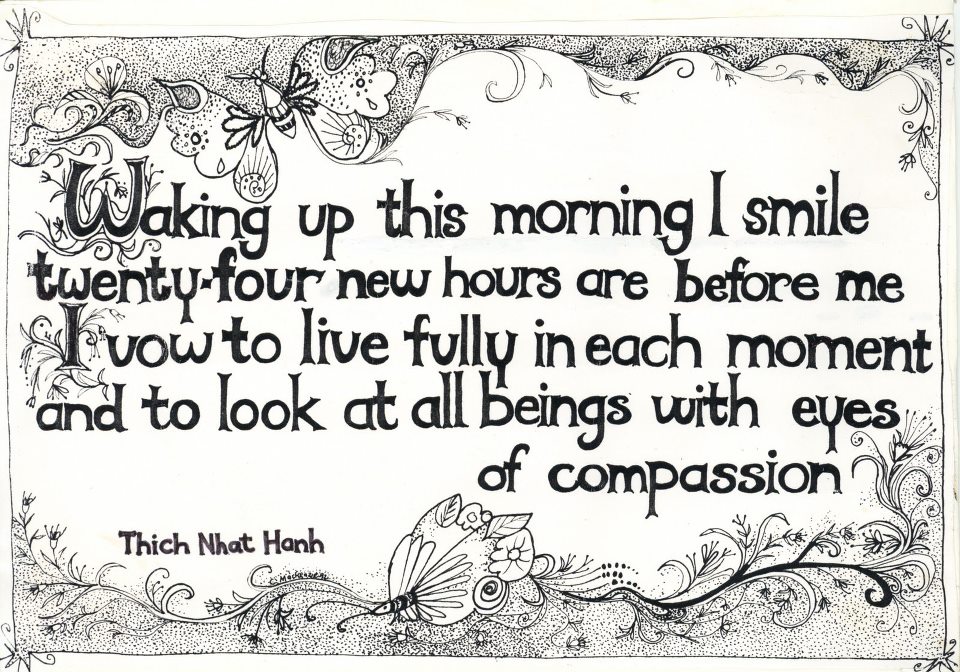
Carrying water is the practice
When I was ordained as a novice monk, my teacher gave me a book of verses to learn by heart to practice mindfulness. The first verse is, “Waking up this morning, I smile. I know I have twenty-four brand new hours to live. I make a vow to live them deeply, fully, every moment, every hour, that is given me to live, and I will learn to look at people with the eyes of compassion.” You memorize that verse and when you wake up, you breathe in with the first line, you breathe out with the second line, and you know you have to live deeply every moment that is given you. That is the practice recommended to us.
As a novice monk, you had to carry water, you had to chop wood, you had to cook breakfast for the community, you had to do many things. But you did these things in such a way that you enjoyed every moment because in the Zen tradition, chopping the wood, carrying water is Buddhism, is the practice, so you had to be able to enjoy that. There becomes no distinction between working and living. You could be very alive doing things this way.
When you drive your car to your workplace, you can drive in such a way that life is possible during the time of driving. After you park your car and walk into your office, you walk in such a way that every step has life. And when you talk with a colleague, the encounter between you is filled with life. A human relationship filled with compassion is possible during the time you talk business.
It is possible to train yourself so that there is no more distinction between working and living. You have to learn this way of living and help our society reorganize in this way too.
The first verse given to me as a novice monk is to wake up and recognize that every morning a big gift is given to you by nature: twenty-four brand new hours. You have to live those twenty-four hours in such a way that you will not waste them. You live deeply. When you brush your teeth in the morning, brush them in such a way that joy, peace, and light are possible. You don’t try to finish so you can do other things. You brush your teeth in such a way that there is joy and happiness, there is contact with nature, with your body. You do not allow thinking to take you away from one moment of tooth brushing. When you go to the toilet, urinating or defecating, you learn to make these moments pleasant. Take the time to enjoy doing these things because they are the practice of the Dharma.
As a novice when you put on your robe, there is another verse to say as you breathe in and out, so that you are aware of what you are doing, and you can do it with joy and ease. Nowadays people may say “time is money,” but time is not only money, time is life, and money is nothing compared to life. In this way you can learn to live more simply, more deeply, and more happily.
In Plum Village none of us has a private house, a private car, or a salary, and yet happiness is possible, brotherhood is possible, sisterhood is possible, good communication is possible, joy is possible. Every day we have time to sit together, to walk together, to eat together, and to share together. We don’t need a lot of money to do any of it. So we have to reorganize our life and our society. We have to remove the pressure that society has on us. When we walk mindfully from the parking lot to our office, we are resisting the pressure of society. When many of us live like that, society will change.
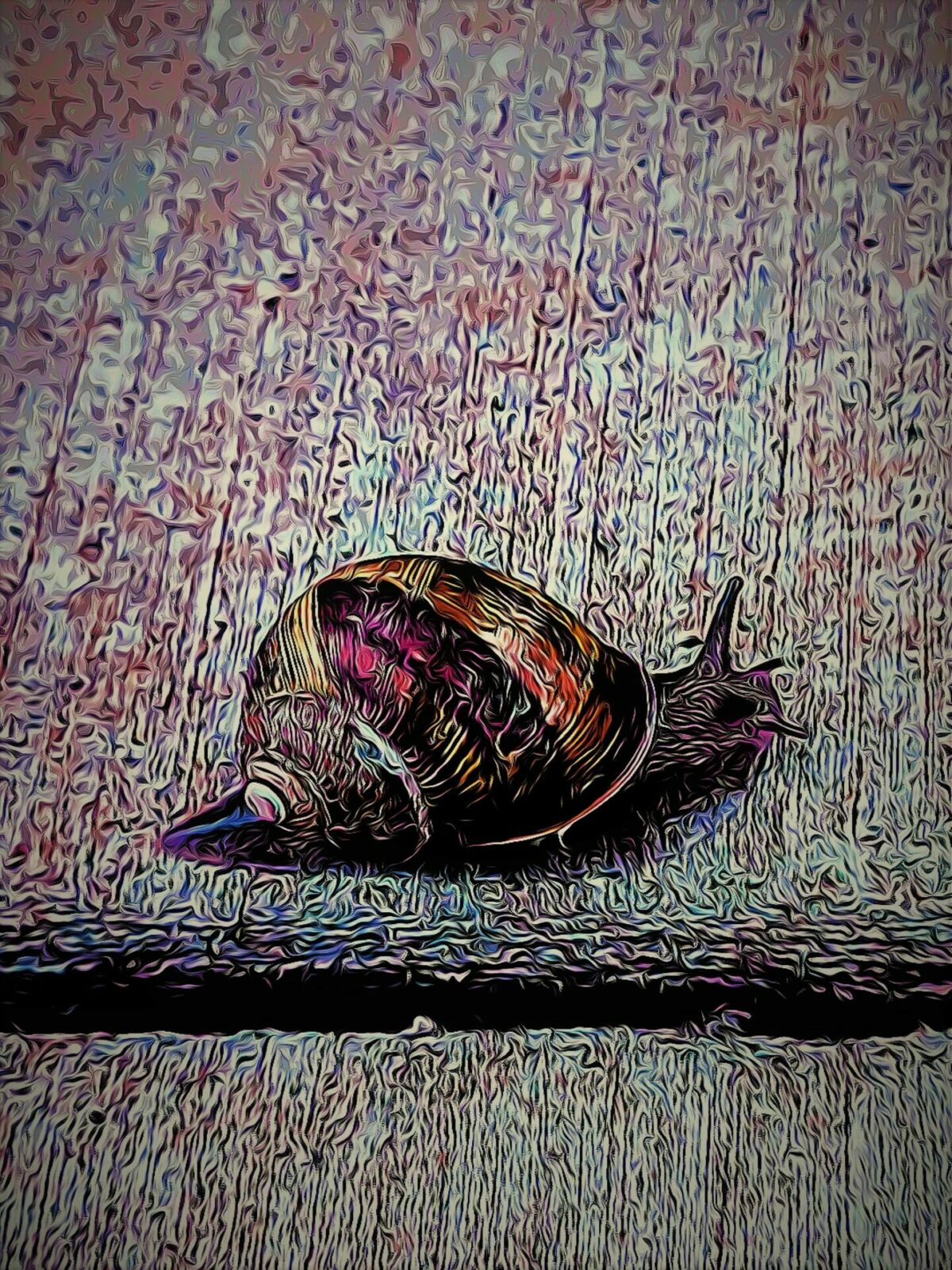
The country of the present moment
A step made in mindfulness, concentration, and insight brings joy and happiness. Each mindful step helps to deal with the energy of restlessness in us and to transform that energy to calm, ease, and peacefulness.
We have to recognize and observe our habit energy. When we see a newspaper, our tendency is to pick it up and read it. But do we need to read that newspaper in that moment? Some of us watch the news every day. Some of us check our email several times a day. There are those of us who cannot stand doing nothing, we have to be doing something, and that is the symptom of restlessness. We look for something to cover up our lack of peace, our suffering, our loneliness. Meanwhile, nature is there, life is there with all its wonders, but we do not have the power to go home to the here and the now to get the nourishment and the healing we need.
There is a country where you can heal more easily and that is the country of the present moment. You need a passport to go to that country and that passport is the practice of mindfulness: mindful breathing and walking. Every breath and every step brings you home to the here and the now, and you find yourself in the country of the present moment. If you know how to live each moment of the present moment deeply, you receive healing, every minute, every second.
Thầy does not have a telephone, he does not have an individual email address, and he survives very well. If there is something important happening in the world, Thầy will know in a few days. He is not in a hurry to know.
You are a wonderful manifestation
There is a school of Buddhism called the school of manifestation only, which teaches that there is no creation, there is only manifestation. Creation means from nothing, there is something. Manifestation means there is no birth, no death, no beginning, no end, just manifestation. During this winter retreat, we will look at this teaching with critical eyes, and try to apply it in our daily life. The mental formations we talked about this morning belong to the teaching of manifestation only. You are not a creation; you are a wonderful manifestation. And if this manifestation ends, you will begin another manifestation. Every manifestation is a wonder. If you are not a flower then you will be a bird, and if you are not a bird, you will be a cloud. Every manifestation is a wonder, don’t worry.
Welcome to the Winter Retreat, enjoy the Sangha and receive the healing every moment. There is nothing to do now, and nowhere to go. We are very lucky.
This is part two of the first Dharma talk of the winter retreat, November 17, 2013, in the Stillwater Meditation Hall, Upper Hamlet, Plum Village, France. Part one is available here. Listen to the full Dharma talk at Thích Nhất Hạnh Dharma Talks.
